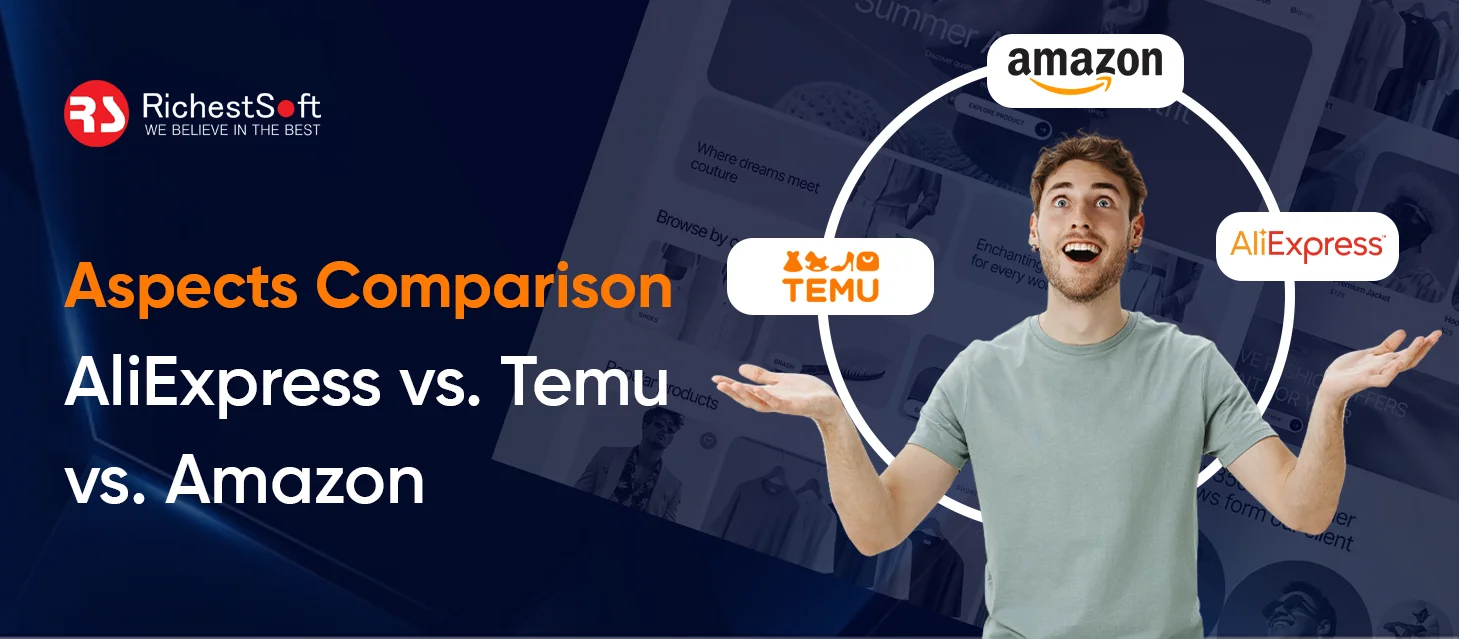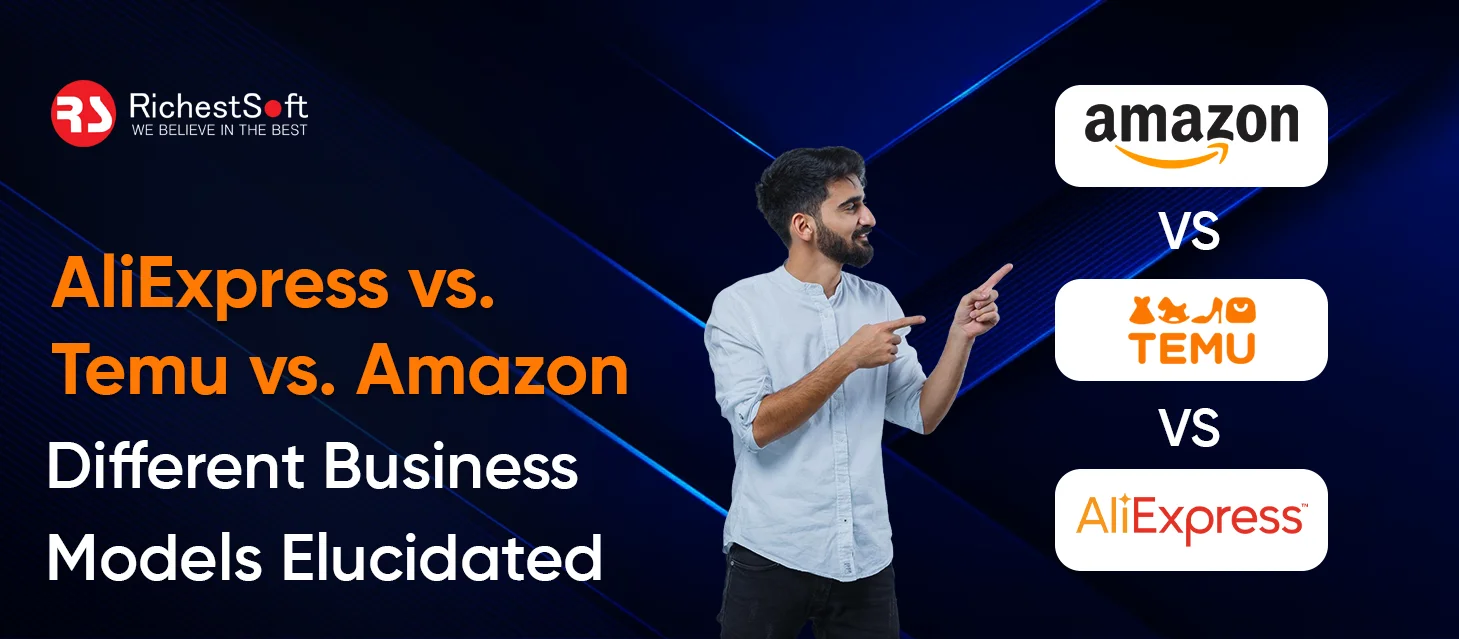February 18, 2026
The e-commerce market is proliferating, and without a doubt, entrepreneurs are exploring a strong online business potential. If you are also planning to launch a Different Business Model app, you are already moving in the right direction. And guess what! Many names in the industry, such as Amazon, Temu, and AliExpress, are making significant profits. Instead of developing a new platform, you can take insight from these platforms to build a powerful and scalable clone.
Each platform operates differently and provides customers with a unique purchasing experience. Businesses may create comparable apps that are user-friendly and loaded with contemporary features with the assistance of skilled eCommerce app development professionals. However, it’s critical to comprehend the inner workings of these platforms in order to succeed.
So curious to know about these platforms? Below, we have shared a breakdown of the business models of AliExpress, Temu, and Amazon.
Aspects Comparison: AliExpress vs. Temu vs. Amazon

To fully grasp the concept of these different business model apps, it is essential to see them in a broader context and how they are distinguished from each other. Have a look-
1. Prices
Temu
Temu usually has very low prices. Many items on Temu are far less expensive than those sold elsewhere. This is because Temu works directly with the individuals who manufacture the products, keeping its own profit to a minimum. People who want basic things at very low prices often choose Temu first.
AliExpress
Due to the fact that you are frequently purchasing directly from the manufacturer or factory, AliExpress is popular and offers inexpensive pricing as well. The pricing remains low because there are no large middlemen who take extra fees. Although AliExpress offers a wide variety of sellers and styles, its pricing can occasionally be a bit higher than Temu’s.
Amazon
Prices on Amazon vary greatly. Depending on the brand and quality, some items are inexpensive while others are more costly. Amazon offers a wide range of options to customers, from those seeking a cheap value to those seeking higher quality. Amazon also gives special savings to people who pay for a Prime membership.
2. Shipping and Delivery
Temu
With Temu, most products take about 5 to 10 days to reach you. It might not be as instant as buying from a store, but it is fairly quick for online shopping from overseas. A lot of items also come with free shipping, so you don’t pay extra for delivery.
AliExpress
With AliExpress, there are different shipping choices. The basic delivery option is slower, and items can take two to four weeks to arrive. However, users pay extra for the fast delivery option, where things might come in about one to two weeks. Also, some people don’t mind waiting because the prices are so low.
Amazon
With Amazon, delivery tends to be very fast. If a user lives near Amazon’s warehouses, they often get fast delivery, especially with Prime. Even without Prime, Amazon’s shipping is usually faster than that of many other online shops.
3. Seller Charges
Temu
Temu has low seller fees, enabling sellers to charge less for their products. As the platform takes a smaller cut, many products are reasonably priced. It’s an ideal choice if you’re hunting for cheap finds.
AliExpress
Sellers on AliExpress are charged a small fee on each sale. As a result, some prices will be higher than Temu’s, but there are a vast quantity of products and sellers on AliExpress. You can also find some rare or unusual items there, too.
Amazon
Amazon sellers are generally charged more fees than Temu or AliExpress sellers. Along with the referral fees, Amazon also have cost of storage and fulfillment. Although these added expenses occasionally lead to inflated costs for consumers, many merchants continue to choose Amazon because it provides an unparalleled customer base and dependable, prompt shipping.
4. Returns and Refunds
Temu
If the product is not what you expected or you don’t like it, you can generally return it to Temu free of charge within 90 days. Temu also assumes liability for your order in transit, providing buyers with additional peace of mind during delivery.
AliExpress
Buyers are entitled to get a refund from AliExpress if the goods remain unused and in their original packaging. Usually, you have about 14 days to make a return request.
Amazon
Items can now be returned to Amazon and a refund or replacement is usually received swiftly. And a lot of people find that Amazon’s return policy feels easy and safe.
AliExpress vs. Temu vs Amazon: Understanding the Business Model

All three platforms have different business model apps. If you want to build a similar platform, you must understand how each company makes money, manages sellers, and handles delivery.
How Their Platforms Work
AliExpress Business Model
AliExpress is more like a public market for people to buy from different vendors. The vendors control the pricing, inventory and shipping. The prices are low, because most companies are wholesalers or manufacturers. The platform monetizes through seller fees, commissions, and value-added services.
Temu Business Model
Temu is also a marketplace, but it remains closely aligned with suppliers. It sends products straight from factories to consumers. The emphasis is on ultra-cheap prices and rapid product trends. Temu is investing heavily in marketing and offering significant discounts to attract buyers and expand rapidly.
Amazon Business Model
Amazon has a hybrid business model where it sells its own inventory and also allows third-party sellers to sell on its platform. Since Amazon runs its own warehouses and delivery system, it has strict rules about packaging and shipping. This leads to high standards of service, quicker deliveries, and an improved overall customer experience, which in turn generates more trust and more purchases.
AliExpress vs. Temu vs. Amazon – Business Model Comparison Table
| Factor | AliExpress | Temu | Amazon |
|---|---|---|---|
| Business Model Type | An online marketplace where many sellers list products | Discount-focused marketplace with strong supplier control | Hybrid model: marketplace + own inventory |
| Product Supply | Products mostly come directly from factories and wholesalers | Products also come from factories, but Temu controls suppliers more | Products come from brands, sellers, and Amazon’s own stock |
| Pricing Strategy | Very low prices, good for bulk and budget buyers | Heavy discounts to attract users quickly | Mixed pricing, often higher but with better service |
| Shipping Model | Global shipping is often slow (weeks) | Faster than AliExpress | Very fast delivery with its own warehouses and logistics |
| Revenue Model | Seller commissions, advertising, and platform fees | Seller commissions, marketing deals, and promotions | Seller fees, ads, Prime subscriptions, and product sales |
| Customer Experience | Depends on seller quality and reviews | Focus on deals, a simple app, and fun shopping | Strong customer service, easy returns, and a trusted system |
| Payment & Security | The platform handles payments, and the quality varies by seller | Uses common payment methods with buyer protection | Very strong payment security and trusted checkout |
| Target Audience | Price-sensitive global buyers | Deal hunters and discount lovers | Wide audience, including premium and fast-delivery users |
| Logistics Control | Low control, depends on sellers and shipping partners | Medium control, strong supplier network | High control over own warehouses and delivery network |
Simple Business Insight of AliExpress vs. Temu vs. Amazon
- AliExpress wins on low cost and global sellers.
- Temu wins on big discounts and fast user growth.
- Amazon wins on speed, trust, and strong logistics
AliExpress vs. Temu vs. Amazon: Revenue Models
Each of these platforms earns money in its own way. Explore these different business model apps and know their revenue models:
1. AliExpress
AliExpress mainly works by taking a small part of each sale made by sellers on the platform.
Commissions:
Whenever a seller makes a sale, AliExpress keeps a percentage. This is one of its biggest income sources.
Ads and promotions:
Sellers can pay extra to show their products to more people. AliExpress earns from these promotions.
Membership services:
Some extra tools or benefits may require a paid plan, which also brings money to the platform.
Supplier charges:
Sometimes suppliers may pay more if they want better visibility or extra support.
2. Temu
Temu’s system is close to AliExpress, but it focuses strongly on pushing large sales at low prices.
Supplier commissions:
Temu takes a share from each order. The rate can change depending on the type of product or seller.
Advertising
If sellers want their items to appear in better spots, they pay for it. This becomes another way Temu earns.
Shipping Fees
While many products look cheap, certain delivery options or locations can add extra charges.
Seller plans:
In the future, Temu may expand paid plans, but right now, most income comes from suppliers and sales.
3. Amazon
Amazon has many ways to make money, and it is more complex than the other two.
Sales commission:
Amazon takes a cut from almost every item sold by outside sellers. This can be small or quite high, depending on the product.
Fulfillment service:
If sellers use Amazon’s warehouses, Amazon charges them for storing, packing, and shipping the items.
Advertising:
Many brands pay Amazon to promote their products. This brings in huge income.
Prime membership:
Customers pay for Prime to get fast delivery and special offers. This subscription is also a major earning source.
The Bottom Line
At last, all we would say is that Temu, Amazon, and AliExpress each have achieved success in a different way. Entrepreneurs should choose their target market before developing a similar platform. This choice can influence your app’s functionality.
However, cloning or white label app development for Temu, Amazon, or AliExpress will undoubtedly be successful for your new business.
For more help, you can contact RichestSoft, a leading Ecommerce App Development Company. We will guide you at every step from conceptualization to development to regular updates. Our app development specialists assist you in expanding your online presence and using the potential of your eCommerce business. If you want to learn more about our app development services, contact RichestSoft today!
FAQs
Q1: Which model should I use for my app?
A: It depends on who you are targeting. Choose low prices, speedy delivery or reliable service for your identity and create the system for that purpose.
Q2: How will my platform get paid?
A: Most apps make money by taking a small percentage of each sale. You could also earn from ads, seller plans, or delivery fees.
Q3: Is it difficult to compete with large brands?
A: It’s tough, but the best new apps can still break through by catering to a particular audience, offering the best deals or the smoothest experience.
Q4: How do I attract sellers to my platform?
A: Offer fair fees, good visibility, and simple processes. Sellers come where they see growth.
 +1 315 210 4488
+1 315 210 4488 +91 99888 06489
+91 99888 06489







